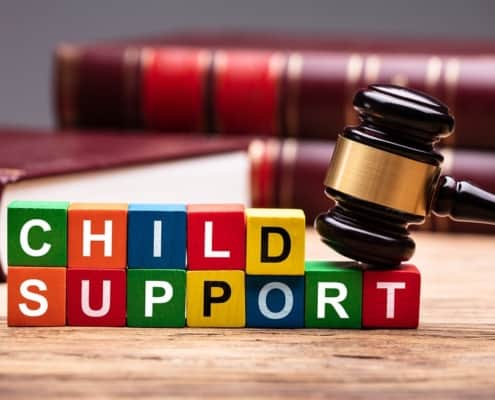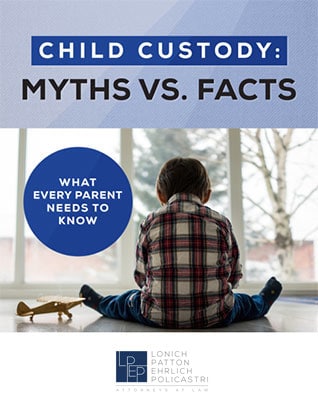What is Child Support?
Child support is a payment made each month by one or both parents to help support their child and provide for any living expenses. It is typically paid until a child turns 18 (or 19 if the child is still in high school full time, living at home, and dependent). The amount owed varies depending on a case-to-case basis. It is typically used only to cover the basic necessities of a child such as food, clothing, and housing. However, in California, a parent can ask for special costs to be included in the support order. Additional expenses can include special education needs, travel expenses, certain medical bills, and childcare, among others. There is no guarantee these will be approved, and it is at the discretion of the judge.
Child support can be made in response to divorce, legal separation, annulment, or a DVRO among other things. Often, when parents split up, or when one parent doesn’t want to be involved in the child’s life, the burden falls on one parent alone. In these cases, the parent will seek out a child support order from the court to help provide and care for their child. Both parents should be responsible for caring for a child, but a support order needs to be in place to enforce this responsibility. In certain cases, paternity must be established before a child support order can be approved.
Without a child support order, single parents may be faced with raising a child alone. Everyday expenses may not be able to be met by one parent. This is why it is crucial to get a child support order if one parent has decided not to be involved in raising a child. They still have an obligation to help, and getting a lawyer to work with the courts can help you secure needed financial support.
How Is Child Support Calculated In California?
In each state, child support is calculated differently. California follows strict guidelines for calculating child support in their state. The judge will calculate the support cost based on the following considerations:
- Number of Children – The cost for raising multiple children varies greatly from the cost of raising a single child. If multiple children are involved, the calculated rate of child support will be greater in that case.
- % of Time Spent in Each Parent’s Custody – This is where child custody comes into play. If one parent has custody over a child, it is assumed they are already paying their share in raising the child. Therefore, the noncustodial parent will be responsible for paying child support to the custodial parent. In cases of joint custody, the child support requirements may be different.
- Income of Parents – The income of each parent plays a significant factor in how child support is calculated. If one parent makes drastically more than the other, the parent with less income may be owed support from the other parent. This, of course, goes hand in hand with custody, creating the opportunity for a range of possible outcomes between the two factors.
- Additional Income – Additional income, such as inheritance, also plays a factor in child support calculations. All forms of income will be considered by the judge before doling out an order.
- Health Insurance Premiums & Expenses – While certain medical bills are not included in child support, basic medical costs such as health insurance are taken into consideration. Usually, the parent who has better benefits through their employer are responsible for health insurance costs for their child. There is an opportunity for part of this cost to be reimbursed through child support if, for instance, the parent without better health benefits is also the noncustodial parent. They still have a responsibility to care for that child’s medical expenses.
- Child Support Payments to Other Children – If a parent is paying child support to children from previous relationships, the amount of child support they owe in this case may differ. It’s all up to the judge’s discretion, as they take a parent’s means and needs into consideration.
- Other – For a list of other guidelines used to calculate child support in San Jose and the surrounding Bay Area, please view the California Courts’ guide here.
How To Get Child Support
If you are a parent or legal guardian of a child, you have the right to open a child support case, not pending an existing order. There are several steps you must follow to file for child support.
- Apply for Child Support Services
The child’s parents or legal guardians can open a child support case by filling out an application online or at a local child support agency. The local child support office will contact the applicant after they apply to assist them with the child support process. - Locate the Parents
While it is not always necessary, both parents of the child must be located before a child support order can be made. You can make the process easier and faster by providing as much information as possible about both parents. - Summons and Complaint
Once the child support case is opened, the parent being asked to pay child support will be served with a Summons and Complaint packet, naming them in the child support case. The recipient has 30 days to respond. Otherwise, the judge may order a default child support order that does not consider the parents’ financial situation. - Establish Legal Parentage
Occasionally, legal parentage may need to be established. This can be done by requesting proof that the parents were legally married when the child was born or by a DNA test. If you do not establish legal parentage, you may be assigned legal parentage without your consent. - Create A Stipulated Agreement
In many cases, an individual may want to bypass court altogether. This can be done by creating a Stipulated Agreement. This is a legal document that both parents or guardians agree to. To create a Stipulated Agreement, the parents or legal guardians join with a child support caseworker, either jointly or separately, to agree on an amount for the order. If both parents can agree on an amount, the Stipulated Agreement is signed by both parties and filed with the court. - Judge Sets Child Support Order
If a Stipulated Agreement has not been filed, a court date will be set to determine the amount of child support ordered. To determine the amount of child support, the judge will review both parties’ financial situations, insurance, and other relevant information. - Payments Begin
Once a judge sets a child support order, the court will schedule the payments to begin. Under Federal law, if the obligor is employed, their employer is responsible for withholding the appropriate amount of funds from their paycheck. Contrary to popular belief, garnishment of wages for child support does not indicate an individual’s failure to pay their dues. - Enforce Child Support Order
As a legal court order, a child support order is enforceable by law. Those who do not pay or are late with payments may face legal consequences such as driver’s license or passport suspension, bank and property liens, or even civil contempt charges. Additionally, unpaid court orders are charged 10% interest in California. - Modify The Child Support Order
As situations change, a child support order may need to be amended. If there has been a change in visitation or custody schedule, a job loss or gain, or something relevant, you may be able to modify the child support order. - Close The Child Support Case
A child support case typically closes when the youngest child involved reaches 18 years old, is not a full-time high school student, and the payee is caught up on payments. Child support cases may also end when the child joins the military, is emancipated, marries or registers into a domestic partnership, or passes away.
Once both parties are notified of the closure of the case, the case remains open for 60 days, and is maintained and kept on file for at least four years and four months afterward.
Why Child Support May Not Be Awarded
In rare cases, child support may not be awarded. This may be due to numerous reasons, including (but not limited to):
- The mental health of one or both parents
- The financial circumstances of one or both parents
If you’re concerned you won’t be awarded child support, get in touch with one of our child support attorneys. We offer free consultations to answer any of your questions or concerns.
Child Support Modifications & Enforcement
Child support orders can be modified over time depending on the parents’ or guardians’ circumstances. A child support order may qualify for modification in the following case
- Change in income for one or both parents
- Change in visitation or custody schedule
If the obligor refuses to pay or is late with payments, in addition to a state-mandated 10% interest charge on any unpaid court orders, the obligor may face legal consequences, such as:
- Driver’s license or passport suspension
- Professional and occupational licenses revocation
- Bank and property liens
- Interception of tax refunds and lottery winnings
- Civil contempt charges
How Can A Child Support Lawyer Help You?
A child support lawyer is well-versed in the intricacies of family law and knows what you need in order to provide for your family. They also know the day-to-day changes in the law regarding current situations, such as COVID-19.
With all the added benefits and credits the government offers in these uncertain times, an experienced advocate in your corner is critical.
Why Lonich Patton Ehrlich Policastri?
At Lonich Patton Ehrlich Policastri, our child support lawyers put your family first. Our goal is to ensure you and your children have the support you need, in every sense of the word. If you are facing a child support case, don’t hesitate. Contact one of our dedicated child support attorneys today at (408) 553-0801 or set up a consultation here to learn more.
Free Download: Child Custody Myths vs. Facts
Simply fill out this form to get your download.
Free Download: Child Custody Myths vs. Facts
Simply fill out this form to get your download.




